Goal
Today we continue our exposition into some of the Apostle Paul’s most challenging and hard to understand writings and teachings, having just concluded in our previous post a discussion on the apostle’s naming the “gospel” as “my gospel.” (I would humbly encourage you, if you’ve not already done so, to listen to or read that post if you are so led. Contextually, it is not directly attached to today’s focus passage. But I will say that the previous 5-posts do build upon one another and do lay a firm foundation for understanding today’s focus passage.)
Today our focus passage is found in the Cepher (that is the book) of Romans 2:17-24. However, because this 8-verse passage is so content rich and I don’t want to give you a drink of this spiritual water (so to speak) from a fire-hose, but rather from a water-hose, I’ve chosen to break up this passage into parts and create, yet again, a series within a series which I’ve entitled: “A Question of One’s Jewishness.” So this being Part 1 of this new series within a series, I’ve chosen to only tackle verses 17 and 18 and give it a subtitle of: “Thou Art Called A Jew.”
Attention
Our focus passage for this post reads:
“Behold, thou art called a Jew, and restest in the law, and makest thy boast of God, and knowest His Will, and approvest the things that are more excellent, being instructed out of the law…“
Quite a pronouncement heh? Indeed, a bit of content we need to unpack here. So let’s get into it.
There seems to be a couple prevalent lines of thought out there as it relates to what the apostle may be trying to convey to his readers here. And one line of thought or interpretation is that Shaul is articulating a general attitude he has developed against his Jewish brethren and against Judaism and Torah and he is using this opportunity to somehow clarify in the minds of his Roman readers where he stood on the issue of Judaism versus the True Faith once delivered and the Gospel. It’s as if he is, in a rather cynical manner, stripping off of Judaism, Jews and Torah any veneer–any luster–any perceived importance these elements may have once had in the minds of his readers, certainly with the ultimate goal of re-orienting his readers’ minds and hearts to focus only on the things related to “his gospel.”
That being said, we cannot ignore the fact that such contextually-unsubstantiated thinking carries with it an obvious degree of anti-Semitism and anti-Torah. And we will certainly find as we progress through this series discussions that this line of interpretation or thought holds no contextual water whatsoever.
The other line of thinking or interpretation to consider here is that Shaul is specifically targeting those dreaded Judaizers who appear to have been lurking about the Roman Kehila or assemblies–those same ones who were “troubling” the Gentile members to convert to Judaism in order for them to be a part of the Body of Messiah or of The Way Movement. And in his targeting of those Judaizers it is believed that the apostle’s goal was to firmly put them in their place (that is to strip them of any authority and influence they held) and empower the Gentile converts of the assemblies to pay those Judaizers no mind and to focus exclusively on the gospel and teachings that he and his evangelistic team sought to bring to them.
Certainly, this line of interpretation holds more contextual water than the first. But we will see as with the first line of interpretation or thinking that there is no evidence that the apostle is necessarily targeting any specific Judaizers of the Roman Assembly here in this passage.
Now, a third line of thinking or interpretation of this passage is based upon a rather rational and pragmatic understanding of the language and literary styles commonly found in scripture and in extra-biblical writings of Shaul’s day. For we find here in this passage, as well as in other Pauline passages, and even in some of the teachings and discussions that our Master Yeshua engaged in, the use of a literary method referred to by some as a “diatribe.”
A diatribe is defined in dictionaries as a “forceful and bitter verbal attack, criticism or denunciation of or against someone or something.”
Shaul uses a diatribe style of writing here in this passage: A style commonly used by a number of ancient Greco-Roman philosophers and polemicists. This style, according to Bible Commentator Craig S. Keener, was used primarily to “teach and exhort rather than attack” (IVP Bible Background Commentary on the New Testament).
Now, the framework of most diatribes involves that of an “imaginary opponent” taking the idealized improper or wrong position on the subject at hand. In the case of our focus passage here, the speaker or framer of the content being discussed–who is in this case the Apostle Shaul–uses the diatribe as a literary tool with the purpose of destroying his imaginary opponent’s position or perspective on the issue and topic that is set before his Roman readers. And he achieves the goal of destroying his imaginary opponent’s position or perspective by systematically “reducing it–the imaginary opposer’s position on the issue–to its absurd logical conclusion” (Keener; pg. 418).
The opponent of Shaul’s diatribe here is the “religious Jew” whose primary, manifested faults we will see, is his hypocrisy; his arrogance; his bigotry; his disobedience to Torah; and his blindness to name just a few.
As common to this passage, and in several other places in the apostles’ writings, the speaker employs what is described by Keener as “brief, pointed rhetorical questions” (ibid).
The thing about Shaul’s, and even our Master’s recorded diatribes in the Gospel accounts, is that the “someone,” the focus of their criticisms or denunciations, were rhetorical persons; generally idealistic persons; classes or types of people who demonstrated qualities or traits that were un-Godly and contrary to the qualities and traits that Yah’s set-apart ones should possess and practice. In particular, Shaul’s criticism or denunciation, especially as it relates to our focus passage, was being leveled against rhetorical Jews, better described as “religious Jew,” while in the case of Yeshua, His rhetoric was generally leveled at the Jewish leaders (I.e., the scribes and pharisees) of His day.
That being said, as far as we can tell, the apostle’s diatribe here in our focus passage doesn’t seem to be leveled at any specific person or persons; unlike the individual who Shaul pointedly called out over his overt sexual sin in his letter to the assemblies in Corinth (1 Cor. 5:1).
So what we discover as we proceed through the apostle’s “rhetorical” diatribe in this passage, which he boldly levels at an impious class of Jews (or I much prefer to describe them as “religious Jews”), is not a diatribe, nor criticism, nor attack against all Jews or against Judaism as some would claim. For we will clearly see as we go along here that the apostle is in no way expressing, nor is he promoting any anti-Jewish or anti-Semitic doctrine, which unfortunately, organized denominational religion has interpreted this and other similar Pauline passages to mean.
And I suspect that much to the disagreement of some, we will find later on in our discussions on this chapter, that Shaul actually reveals his love for his Jewish kinsmen as well as he certifies the virtues of the “pious” (covenant-keeping and walking) Jew of his day. You see, it is evident that Shaul loved his Jewish brethren. Evidence of his affinity towards his Jewish kinsmen is recorded later on in this very letter:
“I am speaking the truth–as one who belongs to the Messiah, I do not lie, and also bearing witness is my conscience, governed by the Ruach HaKodesh: my grief is so great, the pain in my heart so constant, that I could wish myself actually under God’s curse and separated from the Messiah, if it would help my brothers, my own flesh and blood, the people of Israe’el! They were made God’s children, the Sh’khinah has been with them, the covenants are theirs, likewise the giving of the Torah, the Temple service and the promises; the Patriarchs are theirs; and from them, as far as his physical descent is concerned, came the Messiah, who is over all. Praised be ADONAI for ever! Amen” (Rom. 9:1-5; CJB).
Friend: Can you sense here the immense internal struggle that was obviously going on within the apostle over the spiritual plight of his Jewish brethren? You see, when we factor in passages such as this one here, into an overall discussion of our focus passage, it should have the effect of putting the whole question of the Jew, especially the “religious Jew” of Shaul’s day, into a proper perspective, such that we can better understand what it was the apostle was trying to convey to his Roman readers. It obviously erases from any forethought going into our discussion that Shaul was some kind of spiritual “turn-coat” to his Jewish brethren. For the reality of the matter stands that the great apostle to the Gentiles was in no way anti-Jewish nor anti-Torah, but instead, honored them both to the point of being willing to forfeit his favored status with YHVH in exchange for their acceptance of the Messiahship of Yeshua and the Gospel that he and His Master preached and taught.
Need
As with most issues and topics that the apostle addresses throughout the body of his writings, Shaul’s diatribe against the rhetorical, religious Jew, carries with it tremendous spiritual application that few are willing to consider and act upon. What do I mean? Well, despite Shaul’s rhetoric being leveled against the “religious Jew” here in this passage, the sentiment–the meat–the overwhelming indictment put forth by Shaul against the “religious Jew”” by default and extension, sheds a revealing light upon any so-called “religious person.”
And what I mean specifically by “religious person” is one who identifies themselves as a member of a particular “religion,” who sits in judgment of those who are not a part of their particular religion; who they themselves do not follow the tenets–the rulings–the precepts–the traditions of their religion the way they’re supposed to. These are those that even seek to draw others into their way of life for the intended purpose of making their newly converted disciple just like them. And their reward consists of their reputation and influence within their chosen religious organization being bolstered. Furthermore, these make up their own rules and practices in and around their denomination’s teachings, rules and traditions, choosing only those elements–tenets–rules–laws to follow that best suits them and that don’t infringe upon their personal lives. They themselves and as an organization are the focus of their religion, not their ideological version of “god.” It’s all about them. Thus, they end up placing their eternal destinies upon their “religiosity” and denominational “affiliation,” not upon their relationship with their version of god.
And this is exactly what the apostle was addressing in his diatribe against the “religious Jew.” And this diatribe in particular serves as a reflection of the “religious…….(Jew; Christian; Messianic; Catholic)”: YOU FILL IN THE BLANK.
Satisfaction
As with every post in this series, we seek to put contextual, historic, linguistic, cultural and even spiritual perspective and meat on some of the apostle’s most difficult and hard to interpret writings.
But in this discussion today, I want in particular to ignite a flame of personal and even spiritual introspection in all of us. For my hope, trust and prayer here today is that we will be able to identify the areas in our walk with Mashiyach where we are falling short, and maybe reflecting the very traits that Shaul’s rhetorical, religious Jew of his day, was widely known to portray.
And the reason why this exercise is even important to the Truth-seeking, covenant-walking elect of Yah is for purposes of, not just recognizing the shortcomings of our relationship with the Almighty–that being “if the shoe fits, where it” sort of thing. But more importantly, “if the shoe does fit” and that shoe is not proper and or needs fixing, then by all means, get that thing–that issue–that sin–that damaged relationship corrected before it’s too late–before we end up having to face penalties and condemnation because of our refusal to fulfill our part of the covenant with the Eternal that we agreed to adopt and walk in as His elect; as His child; as His set-apart one.
We have been called by our Master to holiness and to walk uprightly–perfectly before our Father. For He proclaimed to His disciples, and by extension us today:
“Be ye therefore perfect (in the Greek, “teleios,” meaning complete) even as your Father which is in heaven is perfect” (Mat. 5:48).
In reality, the individual that our Master was describing here is the opposite of the would be religious Jew, Christian, Messianic, what have you. For their day-to-day walk is centered, not upon themselves, nor upon their denominations, but upon the Will and Ways of their Father in Heaven.
Visualization
Romans 2:17-18—You Are Called a Jew
So let’s get into this and see if we can come to terms with what the apostle had to say to the Roman Assembly of Messianic Believers on the question of their Jewishness; and then by extension, what he had to say as it relates to our individual and communal religiosity; our so-called profession of Faith and such.
Let’s first read for understanding our focus passage:
2:17-18: “Behold, thou art called (in the Greek “Eponomazo,” which in English means to be named or called or referred to) a Jew (Jewish here is in respect to that individual’s race, birth and or religion; not his spirituality), and makest thy boast (in the Greek “Kauchaomai,” meaning to glory on account of or to glory in a thing) of God and knoweth His will, and approvest (in the Greek “Dokimazo,” meaning to scrutinize as to determine a thing’s authenticity) the things that are more excellent (in the Greek “Diaphero,” which means in this context to distinguish between good and evil; lawful and unlawful), being instructed out of the law…”
So we find here in these 2-verses the beginning of the apostle’s diatribe which in a literary sense, represents an early sketch of what will ultimately be a painting, if you will, sort of a portrait of a class of Jew, that we’ve already named as simply the “religious Jew.” And he begins the sketching out of this rhetorical religious Jew by boldly stating or naming the theme of his diatribe:
“You are named, called, or identified as a Jew.”
Interestingly, it’s not the apostle himself identifying this rhetorical class of religious individuals as a Jew. The title or name Jew in this particular sense is given to this rhetorical religious figure by his very own admission. And as we progress, we will see how this rhetorical figure defines what it means to be a Jew from their established perspective. In other words, the apostle in his sketching out of the portrait of the religious Jew states boldly at the outset (which is the whole basis of a diatribe–the boldness of the rhetoric) that you, religious Jew, identify yourself as a Jew.
The religious Jew’s view of himself is highly presumptive to say the least. In other words, this rhetorical figure’s self-professed identity of him being a Jew is based upon a mishmash of established and verifiable truths, as well as a lot of made-up stuff. And that’s why it’s so fitting that the apostle chose to use this literary method to paint a portrait of the religious Jew: to bring to the Roman Messianic’s spiritual table, as complete an understanding of what a religious Jew was truly about. And as always in his writings, Shaul simply wanted to put things into their proper perspectives, so as to not dilute the Truth of the gospel nor distract his readers’ focus on their walk in Mashiyach. It’s sort of akin to making sure one pays attention to all of the things of their Faith, while giving even greater attention to the weightier things of their Faith. In this particular sense: One’s Jewishness must be subordinated to one’s covenant relationship with the Eternal.
But getting back to our focus passage, Shaul recognized that the religious Jew presumed they were loved and favored of Yah simply by virtue of “their Jewishness.” By “their Jewishness,” I mean specifically the rhetorical Jew’s biology, heritage, culture and religious affiliation and practices. Their Jewishness, as we will clearly see, had absolutely nothing to do with their walking in covenant with the Almighty nor their obedience to the Will of YHVH. For sadly the criteria for one being a Jew had, at least by Shaul’s day, been reduced to superficial qualities and idealistic-even humanistic traits that had nothing to do with the spiritual qualities that Yah stated would identify one as a true Israelite. And of equal sadness, this diminished, idealistic understanding of what it meant to be a Jew had, by Shaul’s day, become the overriding basis of the Jew’s religion–that is, of Judaism. That is, in many respects, the religion defined what it meant to be a Jew. Yah’s instruction of what a true Israelite, or even a Jew, looks like–acts like–lives like was no longer the quintessential defining element in the religious Jew’s identification of himself.
Consequently, the religious Jew’s “Jewishness” had become the very thing that set them at variance or at odds with the rest of humanity. In fact, their Jewishness had become a thing that was working against their chosen, set-apart status. For their set-apart status identified them to be a people who would know Yah’s will having possession of Torah; thus they were able to discern between the holy and the profane, right and wrong; they were in many respects supposed to be Yah’s favored people above all the nation-peoples of the world.
But if we look a little closer here, we recognize that the apostle never credits this religious Jew with actually doing or walking in the very Thing that set them apart from the rest of humanity–which was their obedience and walking in Torah. Instead, the apostle only credits this religious Jew with having knowledge of Torah. In other words, the apostle is trying to show his Roman Messianic readers that many of his Jewish brethren, in a general course of speaking, were failing to live or walk out their Jewishness in a manner that was consistent with their Title of Israel; or in accordance with the Eternal’s identifying definition of Israelite or Jew.
As Yisraelites, YHVH was supposed to be inextricably attached to the nation’s entire being and purpose–as His title of El is inextricably attached to the latter half of the nation’s name–that is, Isra-EL. Thus, Yah’s identifying identification of the Israelite or the Jew was that they were to be a light to a blind world; priests to a world seeking to connect with their Creator; demonstrating in everything aspect of their existence, what Yah required of those who would be His children: that is being an example to the rest of the world what walking in covenant with the Creator of the Universe was supposed to look like.
Unfortunately, Judah had shed and forfeited much of her Yishrael traits and purpose, choosing instead to be something that YHVH never intended for them to be. Thus, religious Judah set her own path and laws; Judah became the focus, not Yah. Yet religious Judah continued to perpetrate a fraud upon the Gentile world, insisting they were indeed Yah’s chosen ones who were doing the Creator’s Will because only they, by virtue of their possessing Torah and by virtue of their Jewishness, knew Yah’s Will. But their doing of Yah’s Will was based upon a warped and manipulated understanding of Yah’s Will that was heavily influenced by their stiffnecked ways and manner; their greed; their lusts; their arrogance; their self-righteousness and self-centeredness; their bigotry; and one could go on.
Consequently, we know that the religious Jew of Shaul’s day, and we’ll see this played out and verified a little later on in this discussion, had deluded themselves into thinking they had arrived simply by virtue of their Jewishness. They believed they were destined for the “olam haba” (that is paradise or the world to come) simply by virtue of their Jewishness, while the rest of humanity–the non-Jew that is–was destined for “gehinnom” (that is the Jewish concept of hell). To the religious Jew of Shaul’s day, if you were Jewish, you were “in” with God. But if you were not a Jew, then you were naturally “out” with God.
In many respects, the term, or for that matter the title Jew, is inextricably linked to our Faith walk. And that inextricable linkage to our Faith Walk is not made in the most flattering of light, if you catch my drift. Instead, those linkages are often made with an appreciable degree of disdain.
As we are often viewed by the ignorant as being Jewish or having converted to Judaism, more times than not, our Faith practices are viewed in a rather dim light by a great many unknowing Christians and even secularists, despite the fact that we are supposedly living in a tolerance-based “woke-society.” As far as modern day Jews are concerned, we are viewed by a great number of them as usurpers of their religion who have attached ourselves to Judaism for the sole purpose of replacing them as God’s chosen people in the eyes of the world.
I vividly recall a number of occasions when the question of my Faith would come up in conversation with individuals unfamiliar with the tenets of our Faith, when I mentioned for instance that I keep and honor the weekly Sabbath as opposed to the venerable day of the sun; or that I don’t keep Christmas or Easter or whatever, but instead keep the Feasts and set-apart days of YHVH as contained in the Torah, the immediate response by these unknowing souls was generally that of: “Oh, you’re Jewish.” Or, “Oh, you’ve converted to Judaism.” And the response is typically flavored with a frown or a tone that betrays the questioner’s disapproval or disappointment of me and my profession of Faith.
I recall my family expressing their total disappointment in my coming into this beloved Faith of ours. They expressed in a great many words that I won’t bore you with here in this post, the sentiment that I had chosen to take up Judaism, which in their minds is in total opposition to my Baptist upbringing. And I would venture to suspect that a great amount of the negativity that many, such as those of my family, have towards us as it relates to our Faith, is derived from the false understanding of texts such as our focus text, much of their understanding being based upon their life-long anti-Semitism and aversion to Torah.
Now, I won’t mince words here on this subject. A great amount of the negativity that exists in the world towards the Jew and Judaism can biblically be traced back to impious and religious Israel herself. And we kind of get a sense of this from our focus passage here. For the religious Jew did not do his nation, nor his faith any favors by setting themselves apart from, and ideologically above, the nation-peoples of the world, while blatantly violating the tenets of their own professed Faith and the Torah. Their personal and corporate sin–their transgression of Torah, we will see later on in our discussion, led to their being separated from YHVH. In addition, their incessant professions that they were exclusively Yah’s people, who knew the Will of Yah by virtue of their possession of Torah and their Jewishness, all while acting and behaving contrary to Yah’s definition of what it means to be an Israelite or Jew. This hypocrisy naturally led to the nation-peoples of the world seeing Israel and the Jew in a negative light, which ultimately led to the nations profaning and blaspheming the Name of Yah.
We’ll get into this particular issue of the Gentiles profaning and blaspheming the Name of YHVH in an upcoming discussion of this passage.
Now, none of what Shaul writes here in his diatribe against the religious Jew is to say that there weren’t Jews who didn’t walk in Torah as any one who belongs to Yah should. We learn that Zecharyah haCohen and his wife Elisheva (the parents of Yochanan the Immerser) were “both righteous and walked blamelessly in all the commandments and ordinances of YHVH” (Luk. 1:5-6; Rood).
Luke in his narrative here was in no way saying that Zecharyah and Elisheva were perfect and never sinned. What this is saying is that this couple was fastidious and focused in their keeping and in their walking out of Torah throughout their lives, such that no one could ever accuse them of overtly and intentionally violating Torah and its precepts and ordinances. Obviously, if they violated any portion of Torah, they would make the sanctioned and appropriate offering unto YHVH and resume their walk in Torah. And it has to be mentioned here, as it relates to Zecharyah and Elisheva, the exacting requirements of Torah were amplified for Levitical priests, who in addition to walking and keeping Torah without fault, were required to maintain a state of ritual purity at all times (so as to not inhibit their priestly responsibilities) and be a walking and talking example and source of Torah instruction for the average Israelite on the streets of Judea.
So there is a widely held and grossly erroneous misconception and teaching among many within and without our Faith community that blameless Torah keeping was and remains an impossibility. Such thinking implies that Yah’s commandments are too “grievous and impossible to obey” (Rood; CG, pg. 38). But the reality of the matter is that one whose heart is pure and whose mind is steadfast upon Yah, and who desires to walk in covenant with Him can walk and keep Torah blamelessly. Does this mean that one will never falter or sin? No. It just means that one who is walking blamelessly in Torah has made a commitment not to walk or exist outside the framework of Torah in their lives. Their entire life is thus centered around and upon their relationship with the Eternal and the applicable Torah instructions.
You know, I find it ironic that no one finds it impossible to believe that there are those in this nation who can be law abiding citizens who never cheat on their taxes, break traffic or criminal laws and who are just good neighbors and citizens, despite there being thousands upon thousands of local, municipal, state and federal laws on the books of this nation. In fact, in more cases than not, we know for a fact that such people do exist. But when the question of one being able to live Torah blamelessly comes up–keeping, let’s say all the applicable 613 commandments of Torah–the default reaction by many is that no one can live Torah without fault. But we can see here that such thinking is not true. The proper thinking on this matter must be framed in Truth and reality: One can live a life of Torah well and blamelessly, which most of the world has chosen not to do. Will such individuals who’ve committed to living and walking Torah blamelessly ever slip up and sin on occasion? Absolutely. But those slip ups are not the norm in such individuals’ lives. It is in fact the exception. And the achievement of that commitment is made all the more possible by the simple fact that our Heavenly Father has gifted us His precious Holy Spirit that empowers us to walk out Torah despite our living in a corrupt and darkened world. His Torah being inscribed onto the fleshly tablets of our hearts (Rom. 2:15; 2 Cor. 3:2; Jer. 31:33; Heb. 10:16), over time, through the sanctification process, compel us to abhor sin in all its manifestations and influences here on this earth, effectively making us dead to the tug–the lure of sin (Rom. 6), yet alive unto Yah through the atoning work of our Master Yahoshua Messiah (Rom. 6:11). Such individuals are compelled to keep Torah blamelessly because they want to please their Heavenly Father and because it is by spiritual and physical default the right thing to do.
What did Master say regarding the required degree of righteousness we must achieve if we are to enter the Kingdom of Yah? He said that our righteousness MUST exceed that of the Scribes and Pharisees (Mat. 5:20). And the average soul who reads this will invariable default to interpreting one’s righteousness exceeding that of the Scribes and Pharisees as solely that of an imputed righteousness–righteousness that is bestowed upon us because of the atoning sacrifice and work of Yeshua Messiah. And indeed, the righteousness that is imputed unto us by our gracious Elohim factors heavily into the overall righteousness equation which is required of all who would be Yah’s elect. However, the righteousness that exceeds that of the Scribes and Pharisees also includes our intentional walking in covenant relationship with the Almighty which involves the Spirit and Truth keeping and walking in Torah and also teaching others to do so as well (Mat. 5:19). Yes, Yah indeed grants us His imputed righteousness upon our coming into covenant agreement with Him through the ministry of Yeshua Messiah. But we are required to then begin the process of dying to self (that is, giving ourselves entirely over to Yah) and allowing Yah’s imputed righteousness through the agency of the Ruach HaKodesh to do its thing in us. Which means we have to make the conscious decision to believe YHVH (that He is and that He is a rewarder of those who diligently seek after Him), repent, stop sinning, draw nigh unto Him, learn of Him and His Ways, and be obedient to His instructions and commandments. Yah’s not going to do these things for us. Contrary to the religious grace-perversion lovers of this world, YHVH requires His elect to have skin in the game–to be participatory in the covenant agreement. A bilateral covenant agreement, which is the type of covenant that we who walk in the True Faith once delivered enter into, requires that each party fulfill their assigned portion of the bargain: In Yah’s case, He does the hard work of saving, redeeming and restoring us to right relationship with Him; while we on the other end are required to be faithful, to love Him and to be obedient to His instructions and commandments. Yah becomes the defacto boss in our lives while we become His faithful servants; His set-apart children.
So in our focus passage here today, we find Shaul not speaking about pious Jews like Zecharyah and Elisheva, but the religious Jew of his day who selectively walked out Torah (that is, picked and chose the Torah commandments that suited him), while at the same time, sat in arrogant judgment of the world around him, not from a true spiritual basis, but from the basis of his biology-his culture-his heritage.
Continuing on, Shaul writes:
“[And you in being called a Jew] rest in the Law and boast about God…“
In writing that the religious Jew was reliant upon (or rested in) the Law was likely a reference to Torah. However, we cannot completely rule out that he could have also been referring, in addition to the 5-Books of Moshe, to the whole of Tanakh as well as to certain portions of the Oral Law. (The Jew of Shaul’s day, as with many in modern Judaism today, saw all these elements as part and parcel of the Law.)
Contextually, when we view this verse from the perspective of the whole passage, we find that Shaul by the end of the passage circles back and extols the virtues or value of one’s Jewishness such as the Jew being entrusted of Yah to safeguard the Torah and associated worship and understanding of YHVH and His Ways.
In Shaul writing that the Jew “boasted in Yah,” it is conceivable and even likely that the apostle had in mind Jeremiah 9:24-25 where it is written:
“‘If people want to boast, they should boast about this: They should boast that they understand and know Me. They should boast that they know and understand that I, YHVH, act out of faithfulness, fairness, and justice in the earth and that I desire people to do these things, says YHVH.’ YHVH says, ‘Watch out! The time is soon coming when I will punish all those who are circumcised only in the flesh'” (NET).
Then there’s Micah 3:11 which reads:
“The heads thereof judge for reward, and the priests thereof teach for hire, and the prophets thereof divine for money: Yet will they lean upon YHVH and say ‘Is not YHVH among us? None evil can come upon us” (KJV).
In Shaul’s diatribe against the religious Jew, he calls out their cultural, biological and heritage-based reliance upon or association with Torah. In and of itself, the problem was not a general reliance upon Torah by the Jew that Shaul was arguing here. The problem instead was their reliance upon their culture, biology and heritage. There was no thought of covenant relationship nor steadfast obedience to Torah that anchored the religious Jew’s reliance to Torah.
The apostle’s disapproval of the religious Jew is revealed or betrayed by his use of the term “kauchaomai”–kow-khah’-om-ahee or “boast” in the KJV or “gloriest” in the ASV. For his particular use of this term is highly suggestive of a sense of entitlement that the religious Jew believed he possessed by virtue of his Jewishness. In other words, the religious Jew of the apostle’s diatribe here believed he had, in the words of Messianic Commentator and Teacher Tim Hegg, “private rights to God” by virtue that their God being the ‘God of Abraham, Isaac and Jacob’ and therefore not the God of the nations” (Romans Commentary; Torah Resource; pg. 50).
The Greek term “epanapauomai” {ep-an-ah-pow’-om-ahee} that is translated in English to be “rely” in the ESV and “restest” in the KJV refers to one being in a state or condition of repose or finding one’s well-being or inner security, rest, comfort or support in a thing (BDAG).
It must be completely understood here that contrary to established fundamentalist and orthodoxy conventional wisdom, that Shaul is in no way rejecting the role Torah plays in the life of a Jew or any person of Faith. It will become evident to us as we progress along the verses of our focus passage that Shaul’s negativity was not aimed at nor against Torah, but against the religious Jew’s reliance, boasting and possession of Torah which they’ve deluded themselves into believing, gives them complete favor with the Eternal; guarantees them admittance into the Kingdom and salvation from judgment.
Clearly Shaul would be familiar with the Almighty’s view of such a skewed understanding of Torah and one’s Jewishness when He, through the Prophet Jeremiah, wrote:
“Let not a wise man boast of his wisdom, and let not the mighty man boast of his might; let not a rich man boast of his riches; but let him who boasts boast of this: That he understands and knows Me, that I am YHVH who exercises lovingkindness, justice and righteousness on earth; for I delight in these things…” (9:23-24).
Continuing on to verse 18, Shaul writes of the religious Jew:
“…and knowest His [Yah’s] Will…“
Here we find the apostle adds more to the details of his literary portrait of the religious Jew, rhetorically noting that the religious Jew emphatically held to an erroneous premise that he knew Yah’s Will, such that he could inherently discern the difference between the holy and the profane–good and evil–pure and defiled. This understanding comes to them only through their receiving of the Torah, the writings, the prophets and I would add their oral traditions. Another way of wording this is, they have all these gifts and or advantages over the other nation-peoples of the earth simply because the average Jew receives Torah instructions at various times of their lives.
Obviously, these benefits and gifts were sources of great pride to the Jew who could hearken back to Deuteronomy 4:8 where Moshe declared of the Hebrew:
“And what nation is there so great that hath statutes and judgments so righteous as all this Torah, which I set before you this day?“
Nehemiah 9:14: “Thou camest down also upon Mount Sinai, and spakest with them from heaven, and gavest them right judgments, and true laws, good statutes and commandments.”
Most impactive to me is the Psalm passage that addresses this source of Hebrew, and by default, Jewish pride in Torah:
“He sheweth His word to Jacob, His statutes and His judgments unto Israel. He hath not dealt so with any nation: and as for His judgments, they have not known them. Praise ye YHVH” (Psa. 147:19-20).
It should be without the slightest question in any true set-apart, covenant-keeping, Truth-seeking disciple of Messiah’s mind that all of this is wonderful and absolutely an essential benefit of possessing Torah (I.e., the oracles of Yah). However, the Jew that Shaul describes here in his diatribe is not keeping the very thing that he takes pride in and rests or relies upon. And the apostle will expound upon the dangers associated with this dichotomy in succeeding verses. For it’s one thing–it’s a baseline-level way of looking at this thing which is to be proud of the fact that Yah gifted one’s people, and by default, gifted one His Torah. But it’s an entirely whole other level of understanding when that pride one has in his people having been gifted Torah now acts positively on that pride. In other words, that person then takes that Torah gift and walks it out; obeys it. Instead of the individual having pride in the cultural heritage of his peoples’ possession of Torah, his pride rests upon the Elohim who gave that Torah to them; more precisely, his pride rests upon his relationship with YHVH and that pride manifests in the keeping of that Torah. The religious Jew of Shaul’s diatribe, unfortunately, was really boasting upon his Jewishness and NOT upon the substantive relationship that he should have with the Creator of the Universe.
So Shaul inserts into his rhetoric of the religious Jew that the “religious Jew” feels confident, by virtue of their Jewishness, that they did in fact know the Will of the Eternal (sort of an inherent knowing of the Will of Yah by virtue of his Jewishness: “Hey, I’m a Jew, of course I know the Will of Adonai.”
Gamaliel III is quoted as having either said or wrote, regarding the Jew knowing the Will of Yah:
“Do His Will as if it were your will, so that He may do your will as if it was His will. Nullify your will before His Will, so that He may nullify the will of others before your will” (Perkei Avot 2.4).
Now, I agree with Messianic Commentator and Teacher Tim Hegg in his assessment that this saying attributed to Gamaliel is a good one. However, Shaul’s rhetoric against the religious Jew of his day was that this particular Jew simply assumed that he was privy to the divine Will of the Most High, again by virtue of his Jewishness. The problem in their flawed presumptive reasoning, of course, is that there was no presumed submission to the divine will of the Most High. The religious Jew’s assumption that they knew the Will of the Most High proved to be indicative of his “arrogance and pride” (ibid).
And finally:
“…And approvest the things that are excellent, being instructed out of the Law.“
The apostle’s use of the phrase “kai dokimazo ta diaphero,” or as the authorized versions read: “and approve the things that are essential” is better understood as: “and tell (or know) right from wrong” (NJB and NLT). And the logical reasoning for the Jew, be they pious or religious, knowing right from wrong is because they’d received Torah instruction throughout their lives (vs. 18). It was indeed a given that the average Jew of Shaul’s day, by virtue of their Jewish upbringing in most cases, was in most cases capable of distinguishing the difference between right and wrong; the pure from the impure; the holy from the profane. And of course, this ability to discern good from evil and so forth did not come about as a result of their Jewishness, but because they were exposed to Torah from their youth. Thus they were conditioned and trained in a great sense to recognize that which pleased Yah from that which did not please Yah. And this was indeed an important, real benefit of being a Jew.
The problem as Hegg describes it is that “religion” entered into the Torah equation through the Rabbinic system. Thus, the so-called sages began to interpret Torah from the perspective of their own individual preferences, inclinations, and perspectives that were not necessarily based upon Yah’s Holy Spirit revelation. This altering of understanding, from that of Yah’s perspective, to that of the sages’ or rabbis’ perspective was the basis for much of the apostle’s diatribe against the religious Jew as described here. The original, Yah derived meaning of much of Torah, as a result of Rabbinic tradition and law, “overshadowed the meaning of the text” or of Torah altogether (Hegg; pg. 50).
Action
And with that, we will bring this installment of TMTO to a close and pick up our discussion of Shaul’s diatribe against the religious Jew, Romans 2:19-20 in our next installment.
It is again my hope that you not simply focus on the Jewish aspect of Shaul’s diatribe here, but more so, consider the passage that we’ve examined here today from the perspective of our own “…ness;” our Messianic-ness or our Christian-ness; whatever. Are the things–the traits–that Shaul puts forth in his rhetorical portrait of a religious Jew at all applicable to us as set-apart covenant-keeping, Yeshua-focused Torah-keeping children of the Most High?
Are we by chance Messianics in name only, such as suggested of religious Jew here in this discussion–Jews by name or by biology-heritage-culture–only? Where is the level of relationship with the Most High that is factored into our claim to the Name that we hold on to so dearly?
Do we put our eternal destiny into our Torah-keeping or into something more in line with Yah’s purpose for His human creation–like placing or basing our eternal destiny on our relationship with the Most High through Yeshua Messiah and upon our Faith in that overall relationship?
Do we know Yah’s Will for His human creation and for our individual lives. Are we read-up and studied-up on Yah’s Torah such that we know what “Thus saith YHVH our Elohim?” Do we hunger and thirst after righteousness and upon being fed and filled with His Word, go forth and walk out that which we’ve received in faith and in Spirit and Truth? Or do we simply rest upon a false hope of religion that tells us that we are guaranteed salvation–eternal life–simply by saying the sinner’s prayer, getting dunked in a make-shift baptismal pool, and throwing a few duckets into the offering plate from time to time?
Are we by chance a reflection of Shaul’s religious Jew, or are we sold out, died in the wool, hardcore, obedient Messianics who love our Elohim with our whole being as well as our brethren of Faith and who refuse to take our Faith profession for granted.
So I simply leave you with a spiritual assignment in anticipation of our next installment to this series within a series: Conduct a serious self-assessment of who you identify yourself as and whether or not you rest your eternal destination upon the elements of religion and denomination, or upon a true, obedient and substantive covenant relationship with the Almighty.
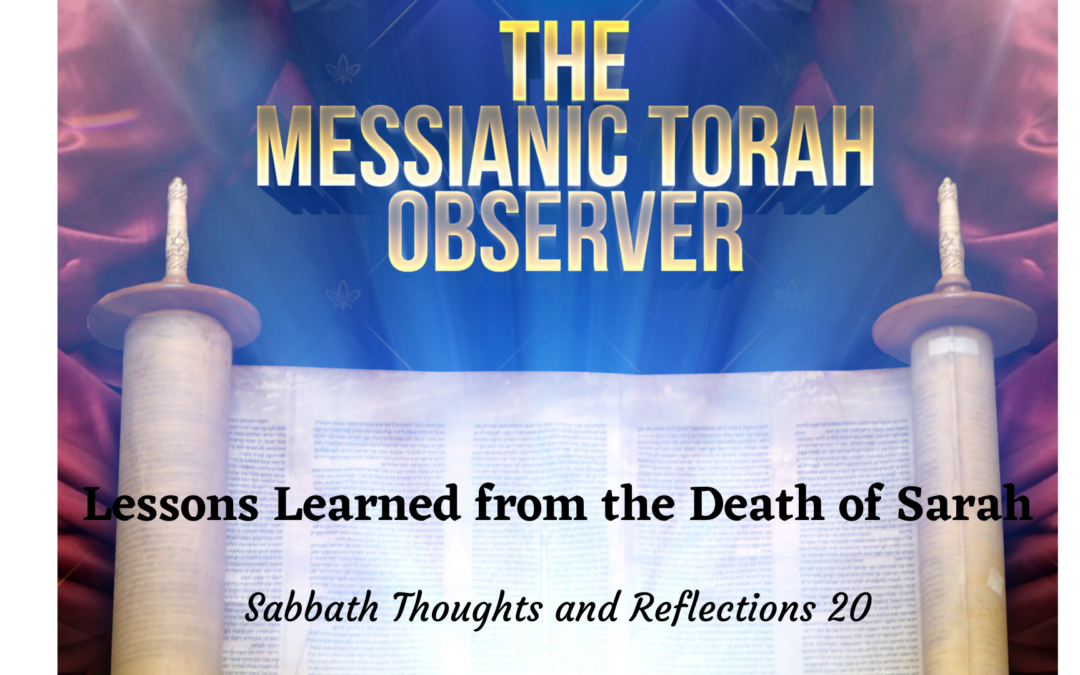
Lessons Learned from the Death of Sarah-STAR-20
In our Torah Reading for this Sabbath, we read of the death of the Matriarch of our Faith, Sarah. And in our discussion, we will explore the eternal truths associated with this sad, but important story. We will touch upon the themes of loving our wives; being a sojourner in this world; burial versus cremation when caring for a deceased loved one; as well as we’ll examine many of the historic and cultural elements that are attached to this beautiful Reading. Shalom and Welcome.
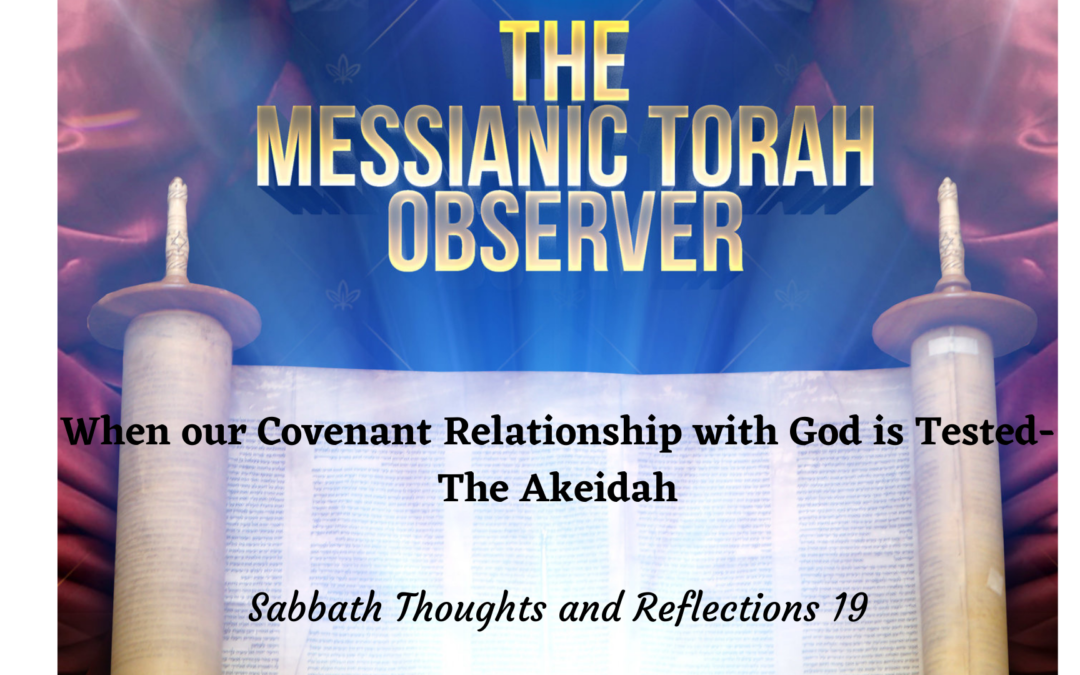
When our Covenant Relationship with God is Tested-Akeida-STAR-19
This week’s Torah Reading is that of the Akeidah or the binding of Isaac. It is a story about obedience, trusting faith and the ultimate goal of the Abrahamic Covenant. We will also explore the ramifications associated with God’s testing of those whom He loves. This is one of the most important Torah Reading Discussions of the Torah Reading Cycle. Come fellowship with us and let’s discuss the Eternal Mysteries of Yah’s Eternal Words of Life.
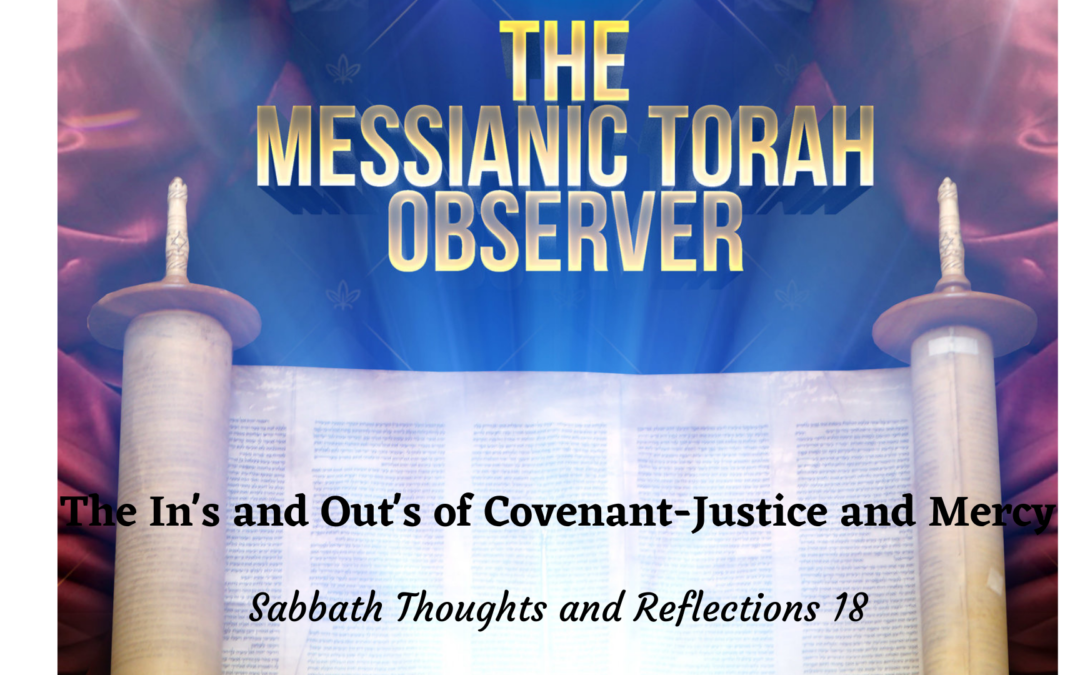
The In’s and Out’s of Covenant-Justice and Mercy-STAR-18
Many of us view covenant as an exclusive club or culture that belongs to God’s elect and those who find themselves outside of covenant are doomed to be outside of God’s blessings and provision. But the truth of the matter is that God operates in ways that are often foreign to us and that defy how we believe God should operate. In today’s Torah Reading discussion, we discuss the in’s and out’s of covenant and how God’s justice and mercy define how He will interact with those who are in covenant versus those who are outside covenant.
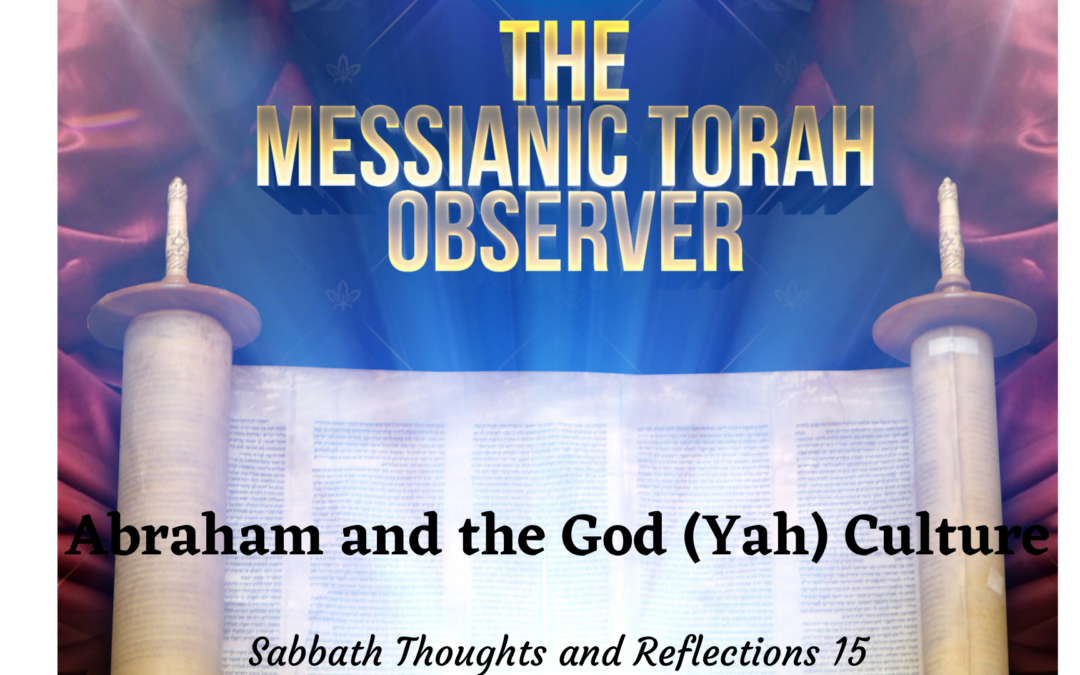
Abraham and the God (Yah) Culture–Sabbath Thoughts & Reflections 15
This week’s Torah Reading touches on a number of relevant themes that include righteousness, justice, reverence, hospitality, boldness, laughter, theophanies and covenant. But the one theme that stands out most is culture. In this installment of TMTO’s Sabbath Thoughts and Reflections, we explore each of these themes, in particular the theme of culture. What is the God Culture/the Hebrew Culture? What was Abraham’s role in that Culture? And what does that culture have to do with us today?
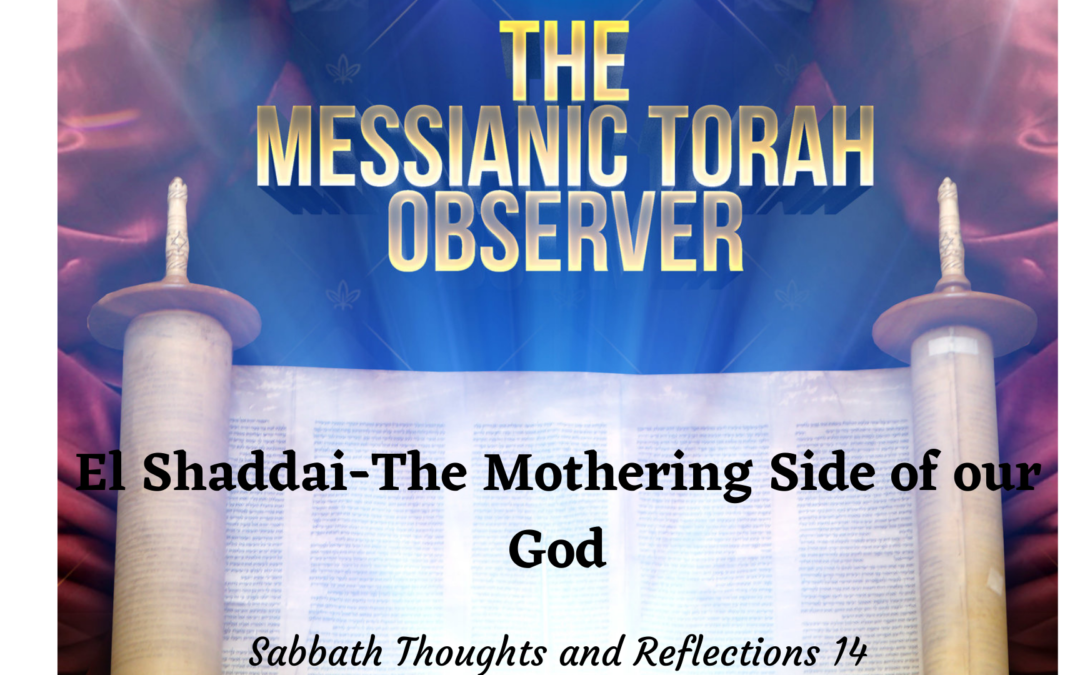
El Shaddai-The Mothering Side of our God-STAR 14
Seems we have been indoctrinated to view God exclusively from a “Fathering” perspective. But could one of God’s revealed names be indicative of a “Mothering” side to the Creator of the Universe? In this installment of TMTO we explore and discuss the power and meaning of El Shaddai.
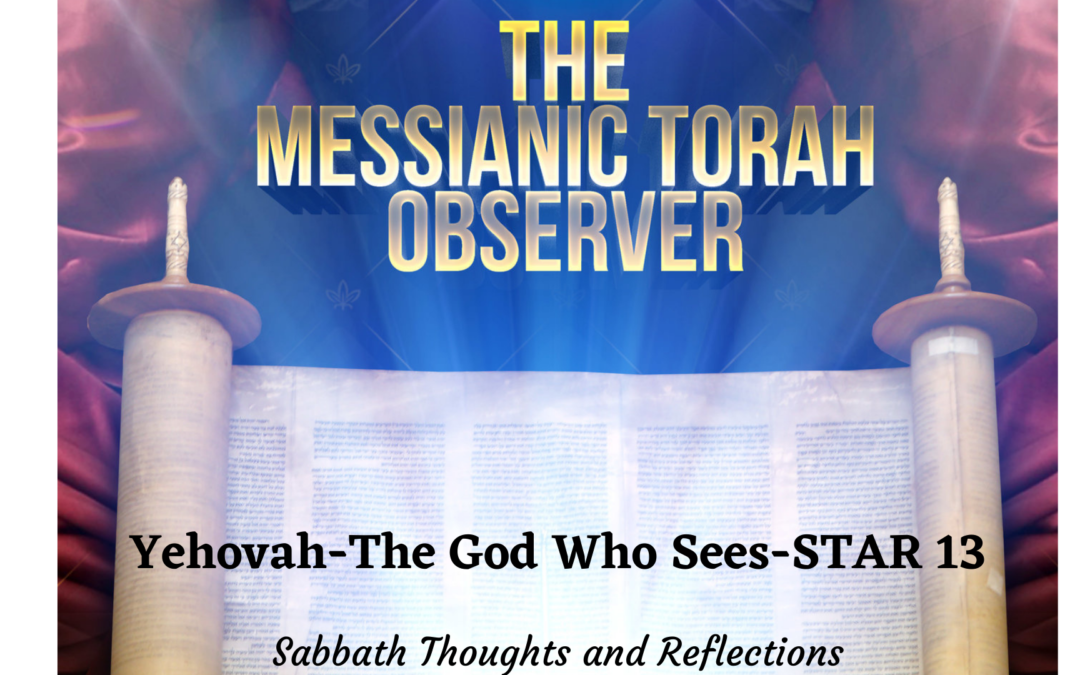
Yehovah-The God Who Sees-STAR 13
In our reading today, we’re led to think and reflect on the themes of:
● Trusting Faith
● Respect
● Patience & Perseverance
● Responsibility
● Honor
● The Spirit Realm Intersecting with the Physical Realm
● Promise
● Sonship
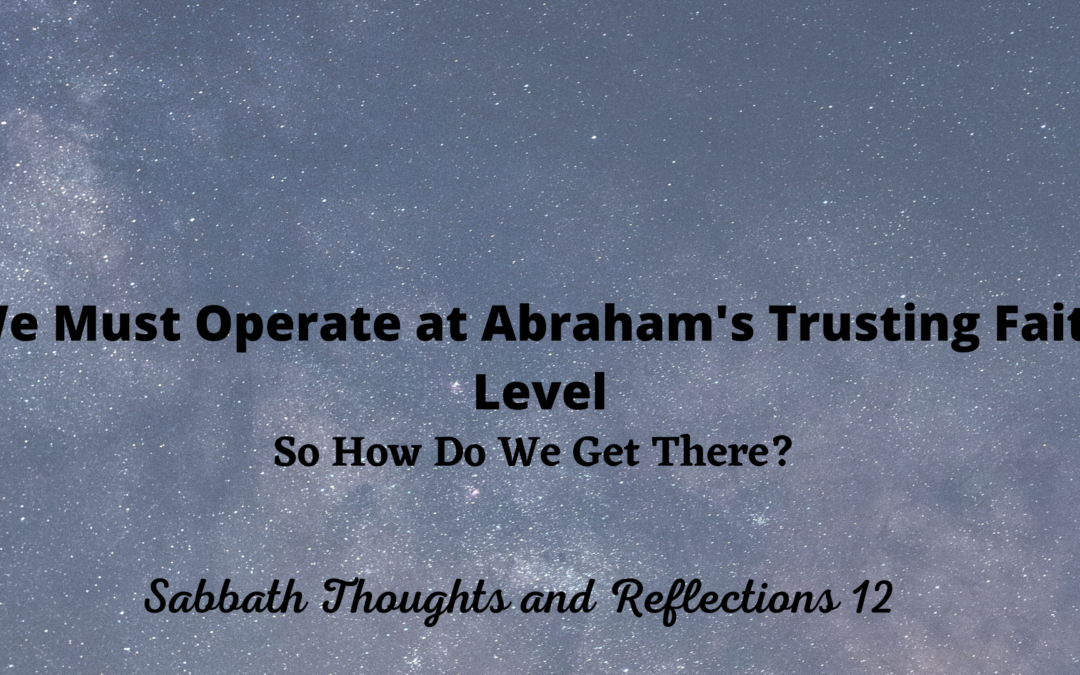
We Must Operate at Abraham’s Trusting Faith Level-So How Do We Get There? STAR 12
Today’s Torah Reading discussion will touch upon a great many themes that include operating in a trusting faith; the righteousness of Elohim; obedience to Yah’s instructions; divine protections and rewards; and the wisdom of challenging or questioning Yehovah.
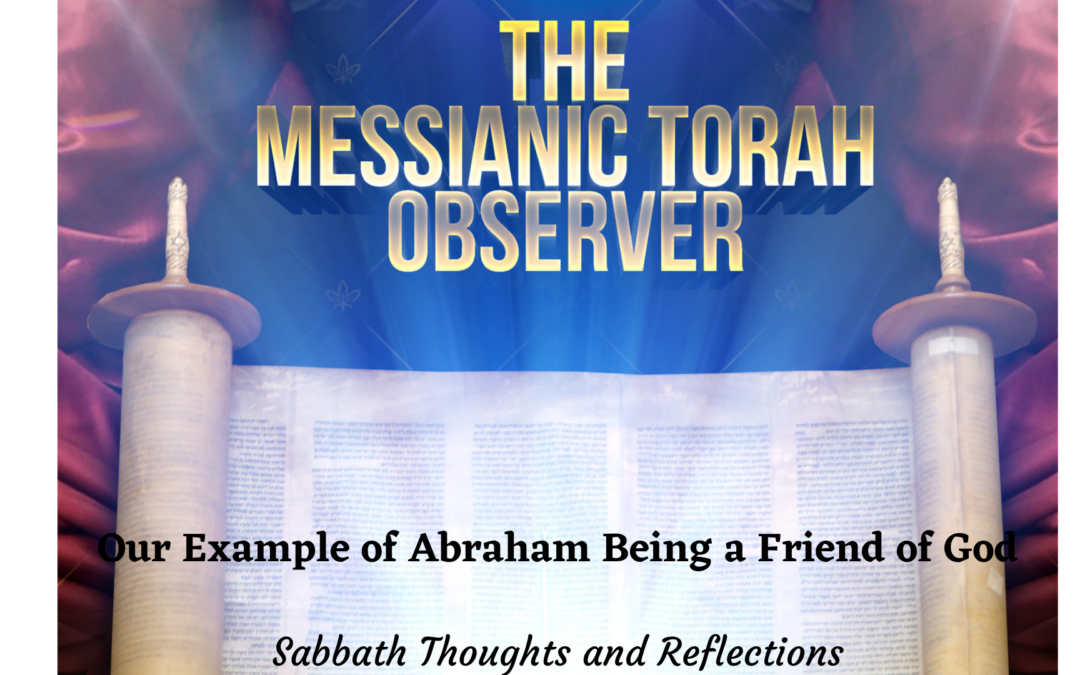
Our Example of Abraham Being a Friend of God-STAR-11
The circumcised heart of an individual—contrite and broken and humble in spirit—is the one thing that captures Yah’s attention and places him or her in contention for being chosen as His friend and ultimately His child. If our heart ain’t right, we ain’t going to be chosen to enter into an obedient covenant relationship with Yehovah, much less a friend or child of His.
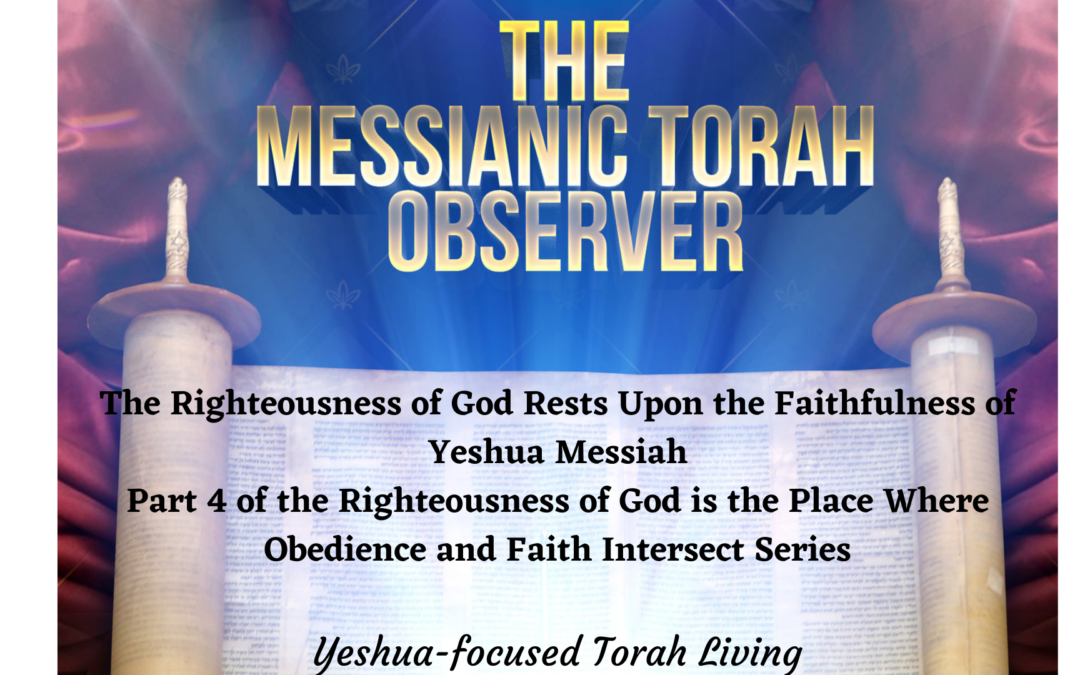
The Righteousness of God Rests Upon the Faithfulness of Yeshua Messiah
Indeed, the Righteousness of God is the place where faith and obedience come together through the Person and Ministry of Yahoshua Messiah. His faithful obedience to Yehovah becomes our faithful obedience, even unto death.
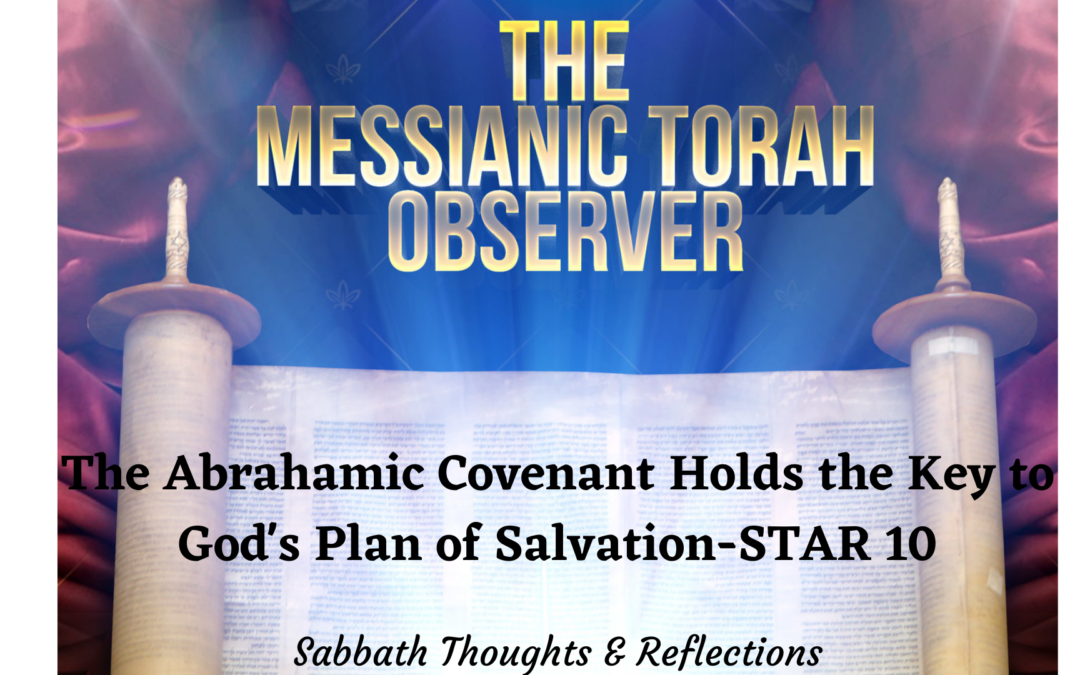
The Abrahamic Covenant Holds the Key to God’s Plan of Salvation-STAR 10
The Abrahamic Covenant is the essential element of this week’s Torah Reading. We find in our discussion that the Abrahamic Covenant holds the key to God’s Plan of Salvation. Shabbat Shalom.
